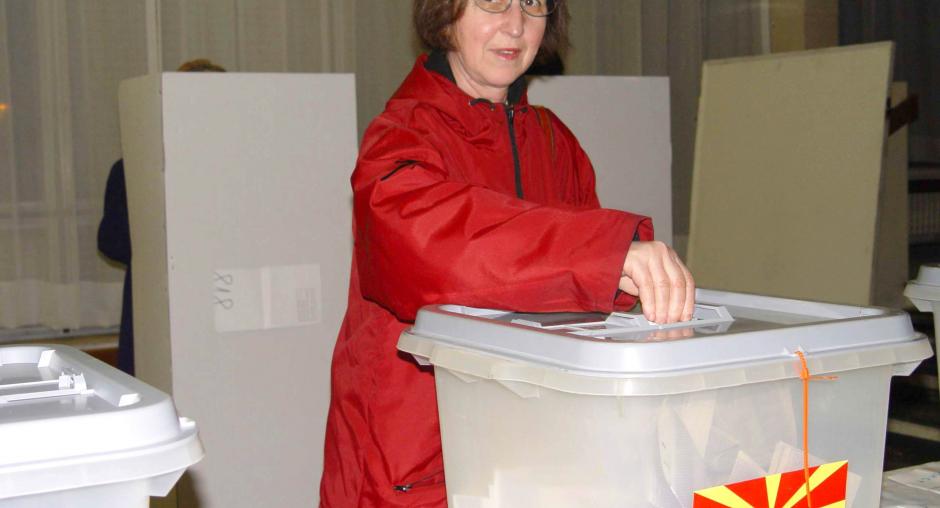Newsroom
Elections largely in accordance with international standards but significant irregularities in some areas, observers say in Skopje
SKOPJE 14 March 2005

(OSCE)A voter casts her ballot at a polling station in Skopje during municipal elections in the former Yugoslav Republic of Macedonia, 13 March 2005. (OSCE) Photo details
SKOPJE, 14 March 2005 - The municipal elections in the former Yugoslav Republic of Macedonia were in line with most OSCE and Council of Europe standards for elections, but failed to meet key commitments guaranteeing universal and equal suffrage and the secrecy of the ballot. Whilst election day was generally well conducted in most of the country, serious irregularities observed in a number of municipalities undermined the universality, equality and secrecy of the vote.
This is the conclusion of the International Election Observation Mission, which published its findings today. Some 360 observers from 39 countries observed the election on behalf of the OSCE Office for Democratic Institutions and Human Rights (ODIHR). They were joined by representatives from the Council of Europe's Congress of Local and Regional Authorities of Europe.
"Whilst the generally orderly conduct of the elections in most places is very welcome, the serious and persistent irregularities in a significant number of municipalities undermine the process as a whole. The behaviour of the persistent offenders must change before the second round," said Julian Peel Yates, Head of the OSCE/ODIHR mission.
Keith Whitmore, Head of Council of Europe Congress delegation said: "Polling went smoothly in many parts of the country. However, numerous cases of group voting, signatures missing on voter lists and overcrowding in polling stations are disappointing. Group voting is a violation of the secrecy of the ballot, is unacceptable and should be seen as a thing of the past."
The campaign atmosphere was relatively calm and all political parties signed a Code of Conduct for the elections. The electoral authorities operated in a collegial and consensual manner, respecting in general the legal deadlines. The media provided voters with sufficient and diverse information, although the news coverage proved to be unbalanced and government interests were over-represented on the public broadcast channels.
Allegations of intimidation, pressure and plans for election-day fraud were indicative of a high level of mistrust amongst the parties and a lack of confidence in the fairness of the electoral process. Legal provisions regarding the appointment of the State Election Commission continue to be inconsistent with the principle of an independent judiciary.
Election day was generally calm and orderly in most of the country. However, observers reported serious irregularities in a number of municipalities, such as ballot stuffing, stolen ballot papers and ballot boxes, open, group and proxy voting, voters not properly checked for ink, voters not signing the voter lists, tension in and around polling stations and intimidation.
The conduct of voting was assessed as "bad" or "very bad" in one of out ten polling stations visited, and the count was assessed negatively in one out of five. The main problems reported during the count were more ballots found than voters who had voted in 10 per cent of polling stations, and the presence of unauthorized persons in 11 per cent of cases. The count was described as poorly organized in 28 per cent of polling stations.
This is the conclusion of the International Election Observation Mission, which published its findings today. Some 360 observers from 39 countries observed the election on behalf of the OSCE Office for Democratic Institutions and Human Rights (ODIHR). They were joined by representatives from the Council of Europe's Congress of Local and Regional Authorities of Europe.
"Whilst the generally orderly conduct of the elections in most places is very welcome, the serious and persistent irregularities in a significant number of municipalities undermine the process as a whole. The behaviour of the persistent offenders must change before the second round," said Julian Peel Yates, Head of the OSCE/ODIHR mission.
Keith Whitmore, Head of Council of Europe Congress delegation said: "Polling went smoothly in many parts of the country. However, numerous cases of group voting, signatures missing on voter lists and overcrowding in polling stations are disappointing. Group voting is a violation of the secrecy of the ballot, is unacceptable and should be seen as a thing of the past."
The campaign atmosphere was relatively calm and all political parties signed a Code of Conduct for the elections. The electoral authorities operated in a collegial and consensual manner, respecting in general the legal deadlines. The media provided voters with sufficient and diverse information, although the news coverage proved to be unbalanced and government interests were over-represented on the public broadcast channels.
Allegations of intimidation, pressure and plans for election-day fraud were indicative of a high level of mistrust amongst the parties and a lack of confidence in the fairness of the electoral process. Legal provisions regarding the appointment of the State Election Commission continue to be inconsistent with the principle of an independent judiciary.
Election day was generally calm and orderly in most of the country. However, observers reported serious irregularities in a number of municipalities, such as ballot stuffing, stolen ballot papers and ballot boxes, open, group and proxy voting, voters not properly checked for ink, voters not signing the voter lists, tension in and around polling stations and intimidation.
The conduct of voting was assessed as "bad" or "very bad" in one of out ten polling stations visited, and the count was assessed negatively in one out of five. The main problems reported during the count were more ballots found than voters who had voted in 10 per cent of polling stations, and the presence of unauthorized persons in 11 per cent of cases. The count was described as poorly organized in 28 per cent of polling stations.
